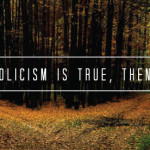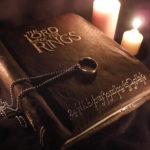A Question I Never Tire of Answering
by John C. Wright
Filed under Conversion

A reader recently wrote me and asked:
Let me get this straight: you, a presumably rational individual who writes science fiction stories for a living, sincerely believes that the creator of our 13.7 billion year-old universe of 70 sextillion stars magically impregnated a human female about 2000 years ago—a woman who then gave birth to a son named Jesus who performed miracles, rose from the dead, and served as the creator’s messenger to humanity?
This might make for a mildly interesting, if outlandish, science fiction story, but the source of your belief system? If you’re going to base your life philosophy on absurd myths, why not choose something a bit more interesting? Why not master the Dark Side of the Force or the Golden Path, becoming a Sith Lord or a God-Emperor and strive to rule a Galaxy? Why choose something as ridiculous and wretched as Christianity? I must admit I am rather perplexed.
I get these sorts of emails fairly often, and here's what I said in reply:
I am more than a presumably rational individual. I was a champion of atheism who gave arguments in favor of atheism so convincing that three of my friends gave up their religious belief due to my persuasive reasoning powers, and my father stopped going to church.
Upon concluding through a torturous and decades-long and remorseless process of logic that all my fellow atheists were horribly, comically wrong about every basic point of philosophy, ethics, and logic, and my hated enemies the Christians were right, I wondered how this could be. The data did not match the model.
Being a philosopher and not a poseur, I put the matter to an empirical test. For the first time in my life, I prayed, and said:
“Dear God. There is no logical way you could possibly exist, and even if you appeared before me in the flesh, I would call it an hallucination. So I can think of no possible way, no matter what the evidence and no matter how clear it was, that you could prove your existence to me. But the Christians claim you are benevolent, and that my failure to believe in you inevitably will damn me. If, as they claim, you care whether or not I am damned, and if, as they claim, you are all wise and all powerful, you can prove to me that you exist even though I am confident such a thing is logically impossible. Thanking you in advance for your cooperation in this matter, John C. Wright.”
And then my mind was at rest. I had done all I needed to do honestly to maintain my stature as someone not who claimed to be logical, objective, and openminded, but who was logical, objective, and openminded.
Three days later, with no warning, I had a heart attack, and was lying on the floor, screaming and dying.
Then I was saved from certain death by faith-healing, after which–
1) I felt the Holy Spirit enter my body, after which–
2) I became immediately aware of my soul, a part of myself which, until that time, I reasoned and thought did not exist-
3) I was visited by the Virgin Mary, her son, and His Father-
4) Not to mention various other spirits and ghosts over a period of several days–
5) Including periods of divine ecstasy, and an awareness of the mystical oneness of the universe, and-
6) A week or so after that I had a religious experience where I entered the mind of God and saw the indescribable simplicity and complexity, love, humor, and majesty of His thought, and I understood the joy beyond understanding and comprehended the underlying unity of all things, and the paradox of determinism and free will was made clear to me, as was the symphonic nature of prophecy. I was shown the structure of time and space.
7) And then Christ in a vision told me that He would be my judge, and that God judges no man. I mentioned this event to my wife. Then about a month later, when I was reading the Bible for the first time beyond the unavoidable minimum assigned in school, I came across the passage in the book of John, a passage I had never seen before, and to which no Christian in my hearing had ever made reference, which said the same thing in the same words:
"For just as the Father raises the dead and gives life, so also does the Son give life to whomever he wishes. Nor does the Father judge anyone, but he has given all judgment to his Son, so that all may honor the Son just as they honor the Father." — John 5:21-22
8) And then I have had perhaps a couple dozen prayers miraculously answered, so much so that I now regard it as a normal routine rather than some extraordinary act of faith.
So I would say that my snide little prayer was answered with much more than I had asked, and I was given not just evidence, and not just overwhelming evidence, but joy unspeakable and life eternal.
(I also regard this overwhelming deluge of evidence to be shameful before my fellow Christian, since the saying told to Doubting Thomas—"Blessed are those who have not seen and have believed"—is a blessing denied me. In hindsight, if only I had not been so arrogant, I could have glanced around at the earth and sky, and seen the intricacy, wonder, and beauty of nature, regarded the unanswerable authority of the conscience within me, and known that I was a created being inside a created cosmos, not a random sandheap blown for a season into a meaningless shape by blind winds. Any child can see it, and all children do.)
To me, the universe was death row, and I was a condemned prisoner who believed everything outside death row was delusion and wishful nonsense. But then I got a call from the governor of the universe, commuting my sentence. I will live forever, as will we all. This was my repayment for a life spent in blasphemy and hatred and slander against God. Instead of smiting me as I damned well deserved, He spared me, and exulted me, and showered me with grace.
I was converted.
I was prepared to say adieu to logic and reason and just take things on faith, when I then found out that the only people who think you have to say adieu to logic and reason in order to take things on faith are crackpots both Christian and atheistic.
Every non-crackpot thinks faith is that on which you rely when unreasonable fears tempt you to disbelieve that to which your reason has consented. If your father says you can dive off the high dive with no risk of death, and he has never lied in the past, and your reason tells you to trust him, it is rational to take his word on faith and jump, and it is irrational to let your eyes overestimate the danger poised by the height.
I then discovered that the Christian world view makes sense of much that the atheistic or agnostic worldview cannot make sense of. I found that even on its own philosophical terms, Christianity is a more robust explanation of the cosmos and man’s place in it, answering many questions successfully that atheists both claim cannot be answered, and then, without admitting it, act in their lives as if the question were answered, such as how to account for the rational faculties of man, the universality of moral principles, the order of the cosmos, how best to live, etc.
Turning to my atheist friends, I then discovered none of them, not one, could give me even so reasonable an argument as I was expert in giving in favor of atheism.
They reasoned as follows: “God cannot possibly exist. Therefore any evidence that you encountered that God exists must be hallucination, mis-perception, faulty memory, self-deception, coincidence, or anything else no matter how farfetched and absurd. Since any evidence that you encountered that God exists must be hallucination, mis-perception, faulty memory, self-deception, coincidence, or anything else no matter how farfetched and absurd, therefore none of your evidence proves God exists.”
No matter what they saw, no matter what they heard, no matter how the world was against them, they would go to the lions rather than look at the evidence, lest their faith in their faithlessness be shaken.
When I pointed out that this was circular reasoning, they called me bad names.
One skeptic, in a bit of a lapse of his vaunted presumably rational character, told me solemnly that I could not possibly have had Jesus tell me something from a book in the Bible I had never read before. He said that I had read it afterward, and developed the previously undiscovered ability to edit and rewrite my memories, which I then used on myself, so that I only thought I remembered Jesus telling me about the nonjudgmentalism of God. The memory was created after I read the passage, and then back-dated. Then I used this power again to make myself forget that I had the power to make myself forget things.
I asked him if I also had the power to rewrite my wife’s memory, since she remembers me telling her about the passage before I read it. He then tried to cut the conversation off, while accusing me of being irrational.
Another atheist told me I induced a heart attack in myself with my previously undiscovered heart-attack inducing power. And then cured the heart pain with my previously undiscovered heart-attack-curing power. I did both things in order to convince myself falsely of a doctrine I did not believe and had no interest in believing, but, unbeknownst to myself, my secret desire to believe was so great that it overwhelmed my sanity and seized control of my subconscious biological and cardiovascular processes. When I questioned him about such things as whether he was familiar with my medical record, or when I asked to see the evidence supporting this theory, he called me names.
I did not get the opportunity to ask him by what means he discovered the hidden workings of my secret unspoken desires, since he had never spoken to me, and he was not within normal mind-reading range. I did not get a chance to ask him whether this strange ability to harm and heal myself at will was something all people had, or whether he thought I had a superpower due to being bitten by a radioactive spider or something of the sort.
Another atheist told me that that heart failure was a coincidence, not a direct result of my prayer tempting God Almighty, and if that had not happened, something else like a car accident would have happened. Since I am irrational, he said, I would have drawn an improperpost hoc ergo propter hoc conclusion no matter what happened, on the grounds that God cannot exist no matter what the evidence says, nor how obvious it is, and so anyone who draws the obvious conclusions from the evidence MUST be irrational.
He, at least, did not call me names, aside from claiminh that I would have made an irrational lapse in judgment no matter what had happened after praying my one experimental prayer to a God in which I had no particle of belief, in order to sustain and support my (nonexistent, at that time) belief.
He continues to suffer the false-to-facts belief that he can read my mind back through time and see the internal workings of my psychology during events where he was not present.
I tried gently to point out the logical error in trying to use reason to persuade me that he, a stranger to me, knew that I suffered from a mental illness that prevented me from reasoning, whereas I, who have access to things like my past history and my medical records and the contents of my thinking, have more authority to speak to the issue than he does, until and unless I am impeached as a witness.
In general, the argument that I am impeached as a witness on the grounds that my testimony did not confirm the prejudices and assumptions of a third party is not one likely to prevail in a court of law, or as a debate among sober philosophers, scientists, nor anyone trained in rigorous reasoning.
I used to be one of you, my dear atheists, and I was good at my job. But enough about me!
My question for you is this: if science discovered tomorrow that the universe was half its apparent age, and estimated the stars as half their current number, would the belief in God somehow be twice as credible in your eyes?
If so, why so?
If not, then, logically, the age of the universe and the number of stars has no bearing on the credibility of belief in God or in the Incarnation.
Again, if you are attempting to persuade me that I should not believe in unusual events, or unheard-of or hard-to-believe events, on the grounds that no unusual nor unheard-of nor hard-to-believe events ever happen, simple logic shows that this cannot be the case:
Logically, every ordinary event is unheard-of before we hear of it. Even the first example of repeated events is unusual until the second example occurs; and events are hard-to-believe when and only when our expectations and our experience does not match: therefore every novelty is as incredible as the platypus when first encountered. Therefore not only do incredible events happen, they must happen, for if they did not, the concept of credibility could not exist.
If, on the other hand, you are arguing that I ought not believe reports of miracles on that grounds that miracles do not exist, and that we know miracles do not exist on the grounds that no believable reports of them are heard, you are arguing in a circle.
You are also implying that the human race, almost all of whom believe in gods, ghosts, magic and miracles of one sort or another, except for that tiny minority of persons who are consistent atheists, just so happened to have all made the same lapse of judgment in the matter of paramount and foundational importance in their lives. And that they continue to do so, some of whom would go to the lions rather than re-examine the aforesaid lapse of judgment. While it is possible that everyone during the parade is out of step except the fond mother’s son in the old joke, this would seem to be as unusual, unheard-of and hard-to-believe as a Virgin birth, if not more so.
The argument that miracles are unbelievable because they are unbelievable, even if it were not circular, is less persuasive than may at first appear, when proffered to a juror who is himself a skeptical eyewitness to several miracles, answered prayers, visions, religious experiences, knowledge of events before they happened, et cetera.
Obviously, I who have seen miracles ex postiori, cannot adopt the a priori assumption that miracles cannot exist and retain my integrity as a philosopher, or my honor as a man. There is simply no going back.
Related Posts
Note: Our goal is to cultivate serious and respectful dialogue. While it's OK to disagree—even encouraged!—any snarky, offensive, or off-topic comments will be deleted. Before commenting please read the Commenting Rules and Tips. If you're having trouble commenting, read the Commenting Instructions.












